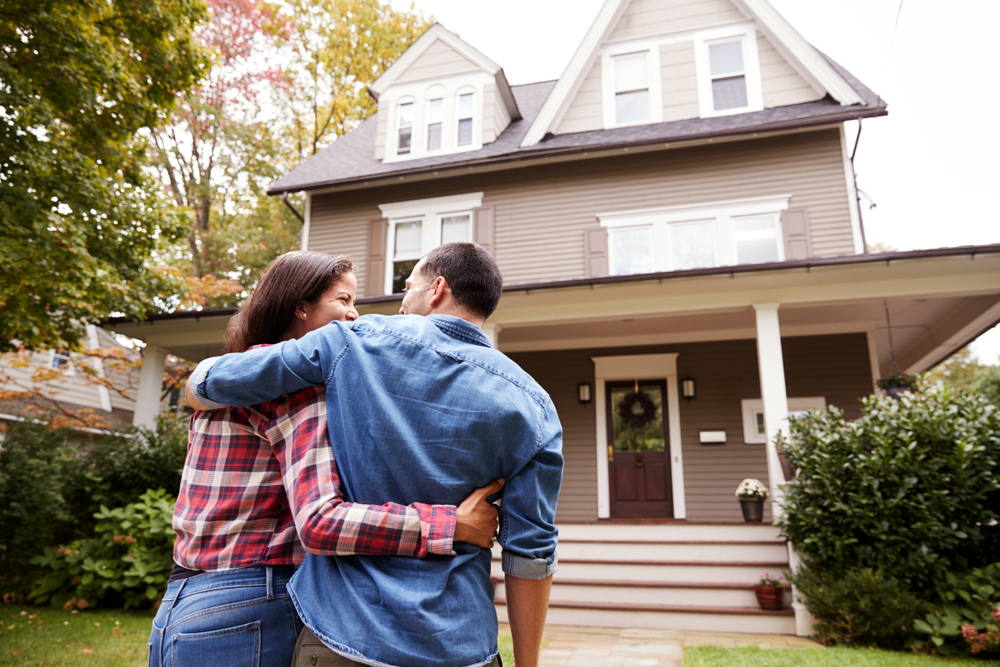
An embracing couple standing in front of their home they obviously enjoy returning to and occupying.
Aging in place has been growing in popularity in recent years for several reasons, but mostly because people enjoy their homes and want to remain living in them. Those same homes might not appeal to us, but that is not important. They don’t need to do this. This is not a general popularity contest but a specific appeal that a home has for its occupants.
Their homes provide a certain amount of stability and comfort for their lives – even security. Even if those homes aren’t perfect and could benefit from some upgrades and renovations, people like their homes and would not be interested in trading them for another dwelling.
They find that their homes provide for their needs and that of their families. Even when their homes do have some shortcomings, people often overlook them or adapt to them. Maybe certain areas of the home are hard to access, or certain aspects of their home are harder to use and enjoy than others, but these tend to be overlooked, ignored, forgotten, discounted, or forgiven in favor of the big picture outlook of viewing their home in a favorable way or focusing on the more positive aspects and features of their home.
Essentially, people conduct an informal cost-benefit analysis in two ways for their property. They look at what it might take to correct some of the most troublesome aspects of their home. It won’t necessarily be everything that they notice but enough that they will feel more comfortable staying in their home. They cost out what it might take and factor in the disruption of their daily routines that would be required to accomplish the work – either done all at once or spread out over a series of smaller projects. Then, they decide to keep doing as they have by making no changes or just a few of them because they can’t justify spending the money financially, or they financially commit to making all or most of the changes they have identified.
They may also do a second or alternate financial analysis of what would be involved in moving to another dwelling – one with fewer things that need to be done to it to make it more accessible than the one they have now. It could even be a move-in-ready home that needs no additional work to accommodate their needs. Then they must decide on what it would take to pack up everything they own, clean up and fix up their current home, list it for sale, get it sold, move everything they have to a new location, say goodbye to years of memories (good and not-so-good), unpack and move in all of their belonging at that new location, and begin living there – as well as the financial consideration involving in marketing and selling their current property and moving into the newer one.
Some people just skip that second type of analysis and go right to one that involves them staying where they are. They don’t need a detailed analysis to reveal that they like the layout of their home with the number and basic size of those rooms, the way they flow from one to another, and what those rooms allow them to do in them. Maybe they could benefit from more space or a reconfiguration of some of the space they have, but generally, they like their home and feel that it works for them.
They have become quite attached to their home and know it very well – so well in fact that they can navigate their home blindfolded and get around easily and safely when there is a power outage or when they get up in the middle of the night without needing to turn on a light to wayfind.
If they were to be given a choice of remaining where they are or moving someplace else, people would want to stay put. They know what they have where they are and either totally like it or have gotten very used to living in it. The thoughts of adjusting to uprooting themselves and moving to a new address may seem adventurous, but it does not appeal to them. They find it unnecessary and therefore unappealing. This is why they remain where they are.
This is based on the fondness that people have for their homes and where they are located – the neighborhood or the physical characteristics of their homesite. This does not even take into account the financial aspects of their home and how that may influence how well they like their home also. To attempt to replace the home they have – assuming that they could – would take a considerably larger investment and higher taxes than is true with their current home.
Whether people were wise shoppers and found the ideal home for themselves when they initially acquired it – however long ago that was – or if it just worked out that they grew to love it, the result is the same. They want to stay and wouldn’t consider leaving it.
